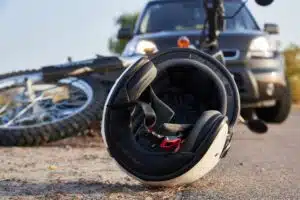Motorcycle accidents are often more dangerous than car crashes due to the lack of protection for riders. The aftermath of a crash can be overwhelming, with physical injuries, financial stress, and emotional trauma. Knowing the legal steps to take after a motorcycle accident can make a huge difference in protecting your rights and securing fair compensation.
This guide explains everything you need to do after a motorcycle accident, from seeking medical care to filing a legal claim.
Step 1: Ensure Safety and Call for Help
The first priority after any motorcycle accident is safety.
- Move yourself and your motorcycle (if possible) out of the roadway to prevent further accidents.
- Call 911 immediately to report the crash. Police and emergency medical services should arrive on the scene.
Even if injuries seem minor, reporting the accident creates an official police record, which is crucial for insurance claims and potential lawsuits.
Step 2: Seek Medical Attention
Motorcycle crashes often result in serious injuries such as broken bones, head trauma, or internal bleeding.
- Get checked by a doctor right away, even if you feel fine. Some injuries don’t show symptoms immediately.
- Medical records will serve as evidence of your injuries when you pursue a claim.
Skipping medical treatment can weaken your case because insurers may argue that your injuries were not serious.
Step 3: Collect Evidence at the Scene
If your condition allows, gather as much evidence as possible at the accident site.
- Take photos and videos of your motorcycle, the other vehicle(s), road conditions, and visible injuries.
- Collect contact information from the other driver, including their license, insurance, and registration details.
- Get witness statements and contact information from anyone who saw the accident.
This documentation is critical for proving fault and liability later.
Step 4: File a Police Report
The police will usually create an accident report, but it’s important to ensure it is accurate.
- Ask for a copy of the report for your records.
- If you notice errors, you can request a correction.
This official record will play a key role in negotiations with insurance companies or during a lawsuit.
Step 5: Notify Your Insurance Company
After the accident, you should contact your insurance provider promptly.
- Provide them with the basic facts of the accident.
- Do not admit fault or make speculative statements.
- Let your attorney handle detailed communication if your case is complex.
Insurance companies often try to minimize payouts. Having evidence and legal guidance can help protect your claim.
Step 6: Understand Liability in Motorcycle Accidents
Liability determines who is legally responsible for the crash. In most cases, negligence plays a role.
Examples of negligence include:
- Distracted driving
- Failing to yield to motorcyclists
- Speeding or reckless driving
- Drunk or impaired driving
In some states, comparative negligence laws apply. This means you may still recover damages even if you were partly at fault, but your compensation could be reduced by your percentage of fault.
Step 7: Keep Records of Expenses and Losses
To strengthen your case, maintain detailed records of your accident-related expenses.
- Medical bills and prescriptions
- Motorcycle repair or replacement costs
- Lost wages and future loss of income
- Therapy or rehabilitation costs
These documents help your lawyer calculate fair compensation for your damages.
Step 8: Consult a Motorcycle Accident Lawyer
Hiring a lawyer who specializes in motorcycle accidents can significantly increase your chances of winning compensation.
- Lawyers understand how to negotiate with insurance companies.
- They can gather expert witnesses to prove fault.
- They ensure that all legal deadlines (statutes of limitations) are met.
Most accident attorneys work on a contingency fee basis, meaning they only get paid if you win your case.
Step 9: Pursue Legal Action if Necessary
If insurance companies refuse to offer a fair settlement, your lawyer may recommend filing a lawsuit.
Compensation may include:
- Medical costs (current and future)
- Lost income due to inability to work
- Pain and suffering damages
- Property damage to your motorcycle and gear
While lawsuits can take time, they may be the only way to ensure you receive the compensation you deserve.
Final Thoughts
A motorcycle accident can change your life in an instant. By following the right legal steps after a motorcycle accident, you protect your health, financial stability, and legal rights.
- Seek medical care immediately.
- Collect evidence at the scene.
- Report the accident and notify your insurer.
- Consult with an experienced motorcycle accident lawyer.
Taking these steps ensures you have the strongest possible case for securing compensation and moving forward after a crash.

